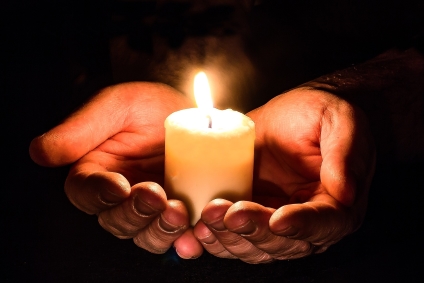The New Stages of Grief

“Embrace your grief. For there, your soul will grow.” ~ Carl Jung
People have been coping with grief since the beginning of human consciousness, yet many of us still find ourselves confused about how to deal with grief when we lose someone close to us. Over the past century, mental health professionals have begun using psychotherapy and counseling to help people coping with grief, but there is still some disagreement on the stages of grief.
The standard view has been that there are 5 stages of grief: denial, anger, bargaining, depression, and acceptance. However, some have begun to question whether they are indeed stages, and how well they represent the grief process. Some psychologists outright refute the 5 stages of grief, and say there are none at all.
With this much confusion about grief, there is a tendency to treat it as an emotional disorder or abnormality, which stigmatizes this natural process and makes it difficult for grievers to talk about their loss, and to help someone who is grieving. The result is a lot of unnecessary pain and anguish over strong, and sometimes conflicting, emotions.
In order to address this issue, I have identified a new set of stages of grief, which I think more closely represent the grief process. If they do, then they will help those coping with grief in two ways:
- They will give grievers a frame of reference so they can gain some sense of direction when they are overwhelmed by their emotions, and
- They will reassure grievers that what they’re experiencing is entirely normal, and there is nothing to be ashamed of when coping with grief.
Here we are going to examine what grief is, how it has been viewed in the recent past, followed by a new perspective. My hope is that this new perspective will clarify some of the misunderstandings about the grief process.
What Is Grief?
Grief is a natural reaction to loss. We all experience it when we lose someone or something important to us. We may feel a variety of different emotions, such as sadness or loneliness. Some may experience anger, resentment, guilt, regret, and even relief. The emotions we experience will depend on the circumstances of our loss, and the relationship we had with our lost loved one.
The Original 5 Stages of Grief
The 5 stages of grief were introduced by Swiss-American psychiatrist Elisabeth Kübler-Ross in 1969. They were a product of her work with terminally ill patients, and were originally meant to describe the process those patients went through in order to cope with their own impending death. They were not meant to describe the grieving process of the loss of a loved one. It wasn’t until sometime later that the mental health community began to apply them to the latter.
The 5 stages of grief are helpful in the sense that they do describe some of the emotions and thought processes that many grievers experience, but they don’t fully describe their frames of mind in the grieving process. For example, anger is a specific emotion, not a frame of mind.
Another shortcoming of the 5 stages is that they don’t always describe the stages very well. For example, the denial stage doesn’t really mean denying that someone has lost a loved one. I’ve never met anyone who has outright denied their loved one has died. They are shocked and have difficulty believing it, but they’re not in denial. Now, it is more likely that some people with a serious illness may deny that they’re ill, which is the situation where Kübler-Ross had originally applied the denial stage. I have seen this.
It is a similar situation with depression. Most grievers do not go into depression. They experience a great deal of sadness, but that is not depression. Actual depression is a more serious mental condition that needs to be treated with therapy and/or medication, and it carries a stigma along with it. It is no wonder many people hide their grief.
The New Stages of Grief
The New Stages of Grief describe the different frames of mind when coping with grief from the loss of a loved one. They are a broader view of the grief process than the original 5 stages. They are meant to give grievers a frame of reference when they feel lost in their emotions, and don’t know what to do.
Keep in mind that there will be exceptions to these stages, as all circumstances surrounding our loss, and relationships with our loved ones are unique. What the New Stages of Grief do is describe the common, or natural, path in the grieving process.
For the most part, these stages are linear. That is, grievers transition from one stage to the next in a gradual manner. While they are linear, there will be some overlap as a person transitions from one stage to the next. However, once they have fully transitioned to the next stage, it is unlikely that they’ll revert to a previous stage. However, new discoveries surrounding the circumstances of our loved one’s death, or a trial in the case of a murder, can bring back strong emotions that have already subsided.
One of the emotions that is common to all the stages of grief is sadness. This is not the same as depression. Sadness is especially intense if we were very close with our lost loved one. While it does diminish over time, we will likely feel some degree of sadness every time we think of them.
The intensity and duration of each stage will vary significantly according to the nature of each the relationship. Some people were very close with few unresolved issues, others more distant with more serious unresolved issues, and any combination. The intensity and duration also depend on how skilled one is at dealing with adversity before the loss.
Here are the New Stages of Grief:
Shock and disbelief. At first, we are usually shocked by the death of our loved one, even in cases when we were expecting it. It’s hard to believe it really happened. If it was completely unexpected, we may think it’s just a bad dream, and we’ll soon wake up to find that everything is fine. Some people may go numb, as it is a major shock to their psyche. This is a defense mechanism of the mind in order to slow the emotions associated with our loss.
In the cases where the death of a loved one is expected, some of the grieving is done beforehand. Examples are loved ones with a terminal illness, or are of advanced age. In such cases, we’re forced to cope with their impending death to some degree. This gives us a chance to begin accepting our loss. However, the actual loss can still be pretty difficult.
Alternate path: Refusal to grieve. Some people may refuse to grieve altogether. They aren’t particularly shocked, and don’t want to deal with strong emotions. People with dominant personalities see themselves as always being in control. They control their emotions, their destiny, and situations around them. To them, showing emotions is a sign of weakness and totally inconsistent with their view of themselves. Although they don’t deny their loss, grieving is completely out of the question. In addition, they may see themselves as too busy to grieve.
People with strong personalities who refuse to grieve are generally not in any great danger. Over time, the memory of their loss will begin to fade, and diminish any strong emotions that may want to surface. They keep their mind occupied through their work, which doesn’t leave any room for grieving.
It should be noted that people with dominant personalities, are not as strong as they might think. They can show a lot of outward courage when confronted with challenging situations, but are afraid to confront their own demons.
In some cases, people may refuse to grieve because they don’t believe they can handle the intensity of their emotions. This is a dangerous situation because they have to resort to some unhealthy behavior, such as using drugs or alcohol, to suppress the emotions. This only postpones the grief, sometimes for many years, all the while the emotions fester in their subconscious mind and disrupt all future relationships.
Early Grief. This is probably the most difficult stage of the grieving process, as it is the most intense. In this stage, the reality of our loss begins to set in, but we can’t accept it. We don’t want to accept it. We just want our loved one back. Some of us may think of scenarios in which we’ll be reunited with them.
No words can comfort us. In fact, we may find them irritating, as others may expect us to begin healing when we’re not yet ready.
This stage is an intensely painful period, as we’re hit with a flood of emotions that may include: anger, hurt, loneliness, guilt, or regret. Some emotions may even be conflicting, such as relief that our loved one is no longer suffering, and guilt that we didn’t do more to save them.
We may find it difficult to function at a normal level, as the emotions can be overwhelming. Some may have difficulty sleeping, while others may sleep too much. Some may have trouble eating, while others may eat too much.
Early grief may be particularly difficult if a person’s identity is deeply tied to that of their lost loved on. This is usually the case when we’re young or middle aged and lose our life partner. It is a time when we’re looking forward to many happy years together, and suddenly that dream is shattered.
The loss of a child is also one of the most difficult. Here we not only grieve for our own loss, but also for a life that was cut short.
Alternate path: Refusal to heal. Some people coping with grief at this stage will allow themselves to feel the emotions of their grief, but may get stuck there, instead of transitioning to the next stage. If they had emotional issues and difficulty coping with adversity before their loss, they will likely have difficulty coping with grief after their loss. They cross a line between a healthy recognition of their emotions and obsession over them.
This can be a dangerous path. If someone goes down this path, hopelessness and despair may begin to set in, and the situation can reach a crisis point, especially if they turn to drugs or alcohol for relief. When it reaches this point, they either get help to get back on a healing path, or run the risk of becoming suicidal, as they don’t see a point in going on living without their lost loved one, and want relief from their anguish.
Realization. In this stage, we begin to realize our loved one isn’t coming back, and we’re not sure if we’ll ever be reunited. Although we realize our loved one isn’t coming back, we’re not yet ready to accept it. In some spiritual traditions, followers believe they will someday be reunited with their lost loved one when they pass on, and this can bring them a great deal of comfort.
Coping with grief becomes a little easier, as the pain and intensity of our emotions begin to subside. This leads to the ability to function more normally. We’re more able to talk about our loss and how we feel. In fact, we may want to talk about our lost loved one to people who can appreciate them.
In this stage, we become more willing to allow the healing process to move forward. Some may even take a more proactive approach.
Search for meaning. Here we begin the struggle to find relief by looking for the meaning of our loss. We may turn to our spiritual faith for answers, where we may or may not find them. We often contemplate the nature of our existence, and our purpose for being here. We feel more comfortable integrating back into society, by engaging in social activities, such as spending time with family and friends.
Alternate path: Getting stuck. In this stage, there is also the possibility of getting stuck, as the griever may not see a path forward. There are several reasons why someone may get stuck here including:
- The loss was traumatic, and the healing process may seem overwhelming
- Prolonged isolation from friends and family
- Not finding enough meaning to meet their expectations
- Codependency such as obsessive dependency on the lost loved one
- Compulsive behaviors, such as use of drugs or alcohol, or excessive eating or spending, in order to avoid coping
- Financial dependence on lost loved one that creates significant hardship
- Pre-existing mental or emotional condition
- General difficulty coping with adversity
- And any other factor that creates significant additional stress on the griever
Sometimes grievers may not actually get stuck here, but rather they just need more time to work through their issues. That’s fine, so long as they keep moving forward.
If someone gets stuck at this point, they run the risk of slipping into depression. In such a case, it may be a time to seek professional help
Diminishing pain. In this stage, the pain begins to subside as the memory of our loss begins to fade. Though we don’t forget, the memories are not as vivid, and reminders are less frequent. Our loss no longer seems like just yesterday. Here we allow ourselves to heal in the best way we know how. Things are starting to make some sense, as we continue looking for meaning. We may even consider rebuilding our lives without our lost loved one.
Acceptance. Here we feel like we’ve found all the meaning we’re going to find, and begin to accept our loss and allow the painful memories to fade. While some people are content to just let the painful memories fade, others may be more engaged in the healing process, and want use their loss as a learning experience in order to grow as a person.
Many people believe that time heals everything. However, time alone doesn’t heal. It just enables the painful memories to fade into the background. True healing takes place when we confront our emotions, and are able gain new insights from a broader perspective (i.e. wisdom), and truly accept our loss.
Return to peace and happiness. In this stage, we learn to find peace and happiness. We may have found some meaning of our loss, and are willing to allow ourselves to be happy. We no longer consider ourselves to be coping with grief.
Some people reach this stage, and some don’t. A lot of it has to do with their outlook on life, and a spiritual practice that helps them evolve and be at peace even during difficult times. Some may actually grow as a result of their loss, as they integrate this experience into their outlook on life as a whole. They may even find a new purpose in life.
Reawakening. For most people, this is not a stage in the grief process. This applies to a very small percentage of the population. These are people who have had a profound spiritual awakening before their loss.
The reawakening stage is characterized by expanded awareness, diminished ego, diminished fear of death, and greater peace. Those who reach this stage have no need for meaning, and are able to accept their situation because they have a much broader understanding of the world and their existence. They have a greater realization and acceptance of universal spiritual principles, such as impermanence and nonattachment. They return to a state of equanimity.
There is also the possibility of someone having a profound spiritual experience after their loss. A spiritual experience is usually triggered by a combination of deep emotional and spiritual crises. This is by no means an automatic response. There are other factor necessary to trigger such an experience, such as mental, emotional, and physical fitness, as well as age.
Related article: How to Better Cope with Grief through Mindfulness
Duration of the Grief Process
Although there are no time frames for each of these stages of grief, some are longer than others. Each person grieves at a different pace, depending on how close they were with their lost loved one, how traumatic the loss was, the number and seriousness of unresolved issues, their coping skills, and how involved they are in the healing process.
There is also the possibility of having a setback. There are several reasons why someone may have a setback, such as another traumatic loss, a divorce, or financial hardship. If someone has difficulty coping with grief to begin with, then it wouldn’t take much stress to derail their healing process.
There is no exact endpoint when coping with grief. Closure, in the context of emotional healing, is not a definitive term. Even when we think we’ve resolved all issues, our subconscious mind is not fully convinced. One clue is if we still feel a little uncomfortable when we think about those issues. Through the stages, there is a gradual coming to terms with the reality of our loss, and we learn how to live without our lost loved one.
How a Loss Changes Us
A major loss can change us in some profound ways, whether we realize it or not. For many people, it is the most difficult experience of their life, especially if the loss was traumatic, untimely, or they were close with their lost loved one. Here are some of the ways a loss can change those who allow the grief process to run its natural course.
We lose our innocence. When we are young, most of us don’t experience a major loss. We tend to think that our loved ones will always be around, and that tragedy only happens to other people. But when it happens to us, it upsets our rosy view of the world with a major dose of reality.
We learn to survive. If a loss is traumatic, many of us believe we won’t survive. The truth is most of us do. We may not realize the significance of this, but it will play a major role in coping with adversity in the future. Then we will have experience to help us cope.
It makes us stronger. Those of us who cope with our grief will come out stronger. We’ve confronted some of our most difficult emotions, and learned to deal with them. This gives us a great deal of self-confidence to deal with future problems.
It makes us wiser. A major loss forces us to ask some deep philosophical questions. By asking these questions, our subconscious mind begins searching for the answers. We may not find all the answers we want, but the few that we do find teach us important lessons about life. And this search may develop into a greater curiosity about life issues.
We become more accepting. Many of us believe we can control almost every aspect of our lives. But the loss of a loved one shatters that illusion in an instant. We realize there are some things we can’t control. Therefore, we become more accepting.
We become more empathetic and compassionate. Before we experience a loss, many of us don’t fully appreciate how difficult coping with grief really is. Having gone through the experience ourselves, we become more empathetic and compassionate of others who are grieving.
We become more grateful. Many of us take for granted all the wonderful people in our lives. Sometimes it takes losing them to realize how fortunate we were. Going forward, we start appreciating more those who are still with us.
We realize life is fragile. We know in the back of our mind that we will all die someday, but we don’t want to confront that reality. When we experience a significant loss, we tend to realize just how fragile life is, and what a miracle it is to be alive.
Overall, we come out of the experience growing a little more, if not a lot more. A major loss forces us to confront issues that we’ve tried to avoid much of our lives. It touches the deepest part of our soul, and we find out what we’re truly made of. In other words, we mature.
Final Thoughts
There has been a lot of disagreement recently about the grief process. This has led to some misunderstandings about it, and therefore how to help grievers get through one of the most painful periods in their life.
The New Stages of Grief that I have outlined above are a broader perspective of the different frames of mind that grievers go through than the original 5 stages. They are meant to give them a frame of reference when they feel lost and don’t know what to do. They are also meant to let them know that grief is a natural human process that almost everyone experiences at some point in their life, and not a mental or emotional disorder.
If we can normalize the grief process, then we can give people greater freedom to cope with their grief without feeling like they’re being judged. And if we all have a better understanding of grief, then we can be better prepared when we experience a loss ourselves, and we can help a friend who is in the middle of the emotional storm.
Source
[1] Kübler-Ross M.D., Elisabeth, and Kessler, David. On Grief & Grieving. Scribner. 2005.
[2] James, John W., and Friedman, Russel. The Grief Recovery Handbook. William Morrow. 2009.
[3] Devine, Megan. It’s OK That You’re Not OK. Sounds True. 2017.
If you enjoyed this article, sign up below for the Blooming Lotus Newsletter and we’ll notify you when the next article is released:





0 Comments